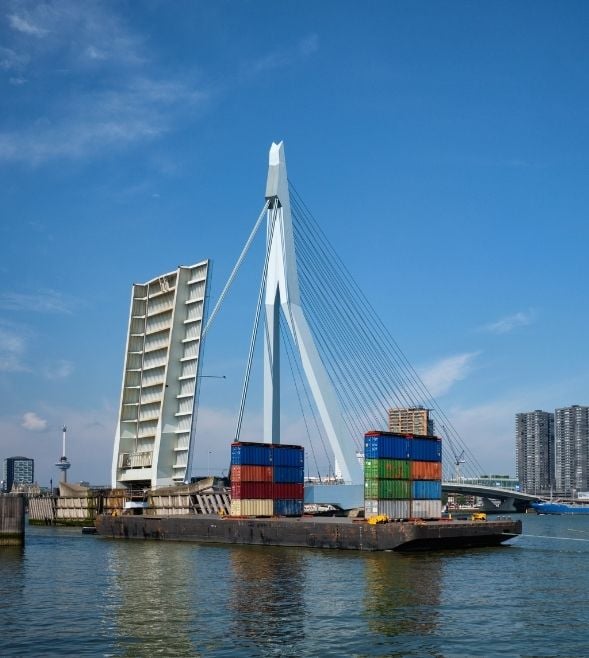-
Financial administration & outsourcing
Entrepreneurs who outsource financial administration reduce the number of administrative tasks and consequently have more time and space to focus on growth.
-
Financial insight
We help you turn financial data into valuable insights that support you in making well-founded decisions. In-depth analyses of your financial situation will help give you a better idea of where you stand and where the opportunities for growth lie, both in the short and long term.
-
Financial compliance
We make sure your company complies with financial legislation and regulations, with correct financial statements, tax reports and other obligations. From our global network, we support you in managing local and international tax risks.

-
Impact House by Grant Thornton
Building sustainability and social impact. That sounds good. But how do you go about it in the complex world of stakeholders, regulations and frameworks and changing demands from clients and society? How do you deal with important issues such as climate change and biodiversity loss?
-
Business risk services
Minimize risk, maximize predictability, and execution Good insights help you look further ahead and adapt faster. Whether you require outsourced or co-procured internal audit services and expertise to address a specific technology, cyber or regulatory challenge, we provide a turnkey and reliable solution.
-
Cyber risk services
What should I be doing first if my data has been kidnapped? Have I taken the right precautions for protecting my data or am I putting too much effort into just one of the risks? And how do I quickly detect intruders on my network? Good questions! We help you to answer these questions.
-
Deal advisory
What will the net proceeds be after the sale? How do I optimise the selling price of my business or the price of one of my business activities?
-
Forensic & integrity services
Do you require a fact finding investigation to help assess irregularities? Is it necessary to ascertain facts for litigation purposes?
-
Valuations
Independent and objective valuations tailored for mergers, acquisitions, and legal matters.

-
Auditing of annual accounts
You are answerable to others, such as shareholders and other stakeholders, with regard to your financial affairs. Financial information must therefore be reliable. What is more, you want to know how far you are progressing towards achieving your goals and what risks may apply.
-
IFRS services
Financial reporting in accordance with IFRS is a complex matter. Nowadays, an increasing number of international companies are becoming aware of the rules. But how do you apply them in practice?
-
ISAE & SOC Reporting
Our ISAE & SOC Reporting services provide independent and objective reports on the design, implementation and operational effectiveness of controls at service organizations.

-
International corporate tax
The Netherlands’ tax regime is highly dynamic. Rules and the administrative courts raise new challenges in fiscal considerations on a nearly daily basis, both nationally and internationally.
-
VAT advice
VAT is an exceptionally thorny issue, especially in major national and international activities. Filing cross-border returns, registering or making payments requires specialised knowledge. It is crucial to keep that knowledge up-to-date in order to respond to the dynamics of national and international legislation and regulation.
-
Customs
Importing/exporting goods to or from the European Union involves navigating complicated customs formalities. Failure to comply with these requirements usually results in delays. In addition, an excessively high rate of taxation or customs valuation for imports can cost you money.
-
Human Capital Services
Do your employees determine the success and growth of your organisation? And are you in need of specialists which you can ask your Human Resources (HR) related questions? Human Resources (HR) related questions? Our HR specialists will assist you in the areas of personnel and payroll administration, labour law and taxation relating to your personnel. We provide you with high-quality personnel and payroll administration, good HR guidance and the right (international) advice as standard. All this, of course, with a focus on the human dimension.
-
Innovation & grants
Anyone who runs their own business sets themselves apart from the rest. Anyone who dares stick their neck out distinguishes themselves even more. That can be rather lucrative.
-
Tax technology
Driven by tax technology, we help you with your (most important) tax risks. Identify and manage your risks and become in control!
-
Transfer pricing
The increased attention for transfer pricing places greater demands on the internal organisation and on reporting.
-
Sustainable tax
In this rapidly changing world, it is increasingly important to consider environmental impact (in accordance with ESG), instead of limiting considerations to financial incentives. Multinational companies should review and potentially reconsider their tax strategy due to the constantly evolving social standards
-
Pillar Two
On 1 January 2024 the European Union will introduce a new tax law named “Pillar Two”. These new regulations will be applicable to groups with a turnover of more than EUR 750 million.
-
Cryptocurrency and digital assets
In the past decade, the utilization of blockchain and its adoption of a distributed ledger have proven their capacity to revolutionize the financial sector, inspiring numerous initiatives from businesses and entrepreneurs.
-
Streamlined Global Compliance
Large corporations with a presence in multiple jurisdictions face a number of compliance challenges. Not least of these are the varied and complex reporting and compliance requirements imposed by different countries. To overcome these challenges, Grant Thornton provides a solution to streamline the global compliance process by centralizing the delivery approach.
-
Corporate Law
From the general terms and conditions to the legal strategy, these matters need to be watertight. This provides assurance, and therefore peace of mind and room for growth. We will be pro-active and pragmatic in thinking along with you. We always like to look ahead and go the extra mile.
-
Employment Law
What obligations do you have with an employee on sick leave? How do you go about a reorganisation? As an entrepreneur, you want clear answers and practical solutions to your employment law questions. At Grant Thornton, we are there for you with clear advice, from contracts and terms of employment to complex matters such as dismissal or reorganisation.
-
Sustainable legal
At Grant Thornton, we help companies integrate sustainability into their business operations, with sustainable legal at the heart of our approach. We advise on ESG (Environmental, Social, Governance) legislation, and help draft sustainable contracts, implement HR policies, and carry out ESG due diligence in M&A transactions (Mergers and Acquisitions).
-
Maritime sector
How can you continue to be a global leader? The Netherlands depends on innovation. It is our high-quality knowledge which leads the maritime sector to be of world class.


Increase your understanding of VAT regulations for your business
Our VAT training sessions are tailored to fit your business activities, giving you insights and knowledge. Tailoring the training allows us to address the specific VAT challenges you face, making the learning experience more practical and relevant.
The European Council on April 5, 2022, adopted new place of supply rules for certain virtual services in its Directive 2022/542 to clarify the value-added tax treatment of virtual events.
New measures
The new measures apply from Jan. 1, 2025, and the changes apply for interactive online events and other live-streamed activities that do not qualify as telecommunications, broadcasting, and electronic (TBE) services. This will include various cultural, educational, entertainment, or similar activities provided via the Internet. The VAT treatment of these virtual events/live-streaming services will be aligned with the VAT treatment of TBE services. This means that from 2025 the supply of a virtual event will be taxable in the country where the consumer resides or is established.
Although the new rules apply from Jan. 1, 2025, several EU countries have already made steps to change the VAT treatment of virtual events, for example by implementing circulars or policy decrees that include the future EU VAT rules applicable from 2025.
Events made virtually available or other live-streamed activities could be provided to either private individuals/other non-VAT-registered persons (business-to-consumer (B2C)) or businesses (business-to-business (B2B). The VAT rules determining the place of supply from 2025 for both B2C and B2B services are explained below.
Business-to-consumer. Activities that are streamed or otherwise made virtually available will be subject to VAT in the EU country in which the recipient of the services is established, has their permanent address, or usually resides.
This means that the providers of such cross-border services must charge the VAT of the EU country of their customers (the threshold of €10,000 applies to EU/Northern Ireland (NI) cross-border suppliers).
Consequently, when an EU/NI business (who has cross-border pan-European sales above the threshold of €10,000) or a non-EU business (no threshold applies) provides cross-border virtual events or other live-streamed activities to non-VAT registered recipients located in the EU, the supplier becomes liable to register for VAT in all EU MSs where it has customers. Alternatively, providers of such virtual services could register for the EU's one-stop shop (OSS) and pay VAT via this single registration.
This means increased compliance costs for businesses providing such B2C virtual services. Providers of virtual events / livestreaming need to be able to identify the locations of their customers since they need to charge the VAT of the country of their customers. Furthermore, businesses not only need to acquaint themselves with the VAT rules of the countries of their recipients to comply with the VAT regulations of all those EU countries but also keep themselves updated with VAT rates and rules of their customer countries.
Business-to-business. The updated EU VAT Directive https://eur-lex.europa.eu/legal-content/EN/ALL/?uri=CELEX:32006L0112 makes it clear that the rule applicable to in-person events does not apply to events “where the attendance is virtual.” Consequently, the default place of supply rule for B2B services (article 44 of the directive) applies to virtual events.
This means that in a cross-border B2B situation no VAT will be charged, and the service provider will apply the so-called reverse charge mechanism. Subsequently, the B2B recipient will self-assess the VAT. This means that the implications for providers of B2B virtual events will be less significant.
Practical Implications
Business-to-consumer. The VAT treatment of events provided to non-VAT registered persons such as private individuals will change considerably, as the VAT of the EU customer’s country should be charged under the new rules. This means that businesses that have such cross-border activities may face increased compliance obligations if they, e.g., should either VAT register in the countries where their customers are residing and remit payable VAT to local authorities or they should pay VAT via the OSS.
Business-to-business. The VAT treatment largely remains the same as under current rules, however, it’s made clear that the place of supply rule which provides that certain B2B events are subject to VAT in the country where they take place does not apply to virtual events. This increases the legal certainty for taxpayers. The reverse charge will apply to cross-border situations and service providers don’t need to register for VAT in all countries of their business recipients since the VAT obligations will be taken care of by their business customers who account for VAT in the country of their establishment.
A possibility to apply reduced rates to live-streamed activities
The EU VAT Directive will also provide a possibility for preferential VAT treatment to live-streamed activities, including events. This will mean that the virtual events will be eligible for the same VAT treatment as events attended in person. Virtual activities will also be eligible for reduced rates. This includes “admission to shows, theatres, circuses, fairs, amusement parks, concerts, museums, zoos, cinemas, exhibitions and similar cultural events as well as sporting events and facilities or access to the live-streaming of those events or visits or both”.
Planning Points
The above changes have a significant impact on the VAT treatment of online events especially those provided to B2C customers, and suppliers of such virtually provided services should:
- Identify virtual events and other live-streamed activities (online teaching, conferences, webinars, virtual attendance of classes, training, concerts, museums, shows, theatres, and sports events).
- Identify where their customers are located and where VAT becomes due.
- Review the possible impact and need for new registrations or an EU one-stop-shop (OSS) registration.
- Find out whether any preferential treatment applies to virtual activities such as a reduced VAT rate.
- Find out what the consequences will be for their VAT burden.
- Analyze the impact on systems, contracts, and invoicing.
More information on VAT rules?
Contact our specialists. They are here to help you.
Contact us










